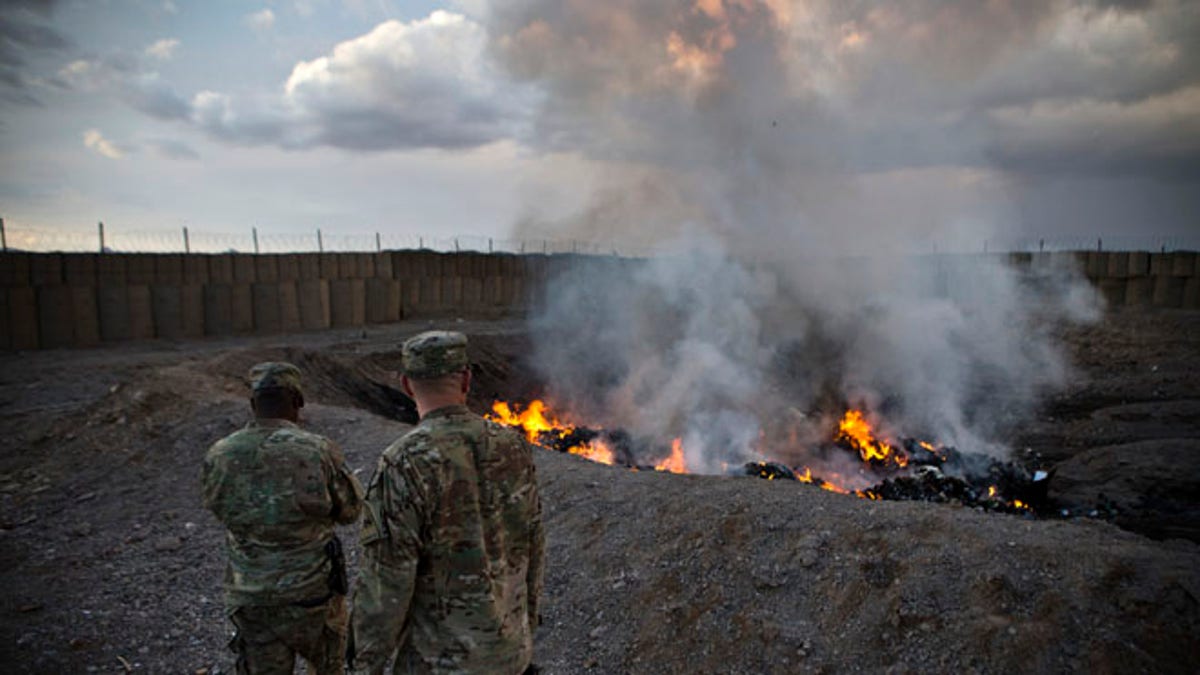
Feb. 4, 2013: U.S. Army soldiers watch garbage burn in a burn pit at Forward Operating Base Azzizulah in Maiwand District. Soldiers at FOB Sharana had to use a similar burn pit because incinerators were not completed. (Reuters)
The U.S. Army Corps of Engineers paid $5.4 million for shoddy trash incinerators that were delivered years behind schedule and never used, leaving soldiers at an Afghanistan base with no other option than to keep burning waste in open-air pits, according to an internal probe.
The report from Special Inspector General for Afghanistan Reconstruction John F. Sopko was released Monday. It found the failure to complete the trash incinerators left soldiers exposed to potential health hazards from the burn pits, and taxpayers, once again, with nothing to show for a multimillion-dollar investment.
“This project appears to have been a complete waste,” Sopko said in a statement to FoxNews.com. “Even worse, the open-air burn pit used instead of the incinerators put the health of our troops at risk.”
The base where the units were sent -- Forward Operating Base Sharana in southeastern Afghanistan -- was turned over to the Afghan government in October. According to the report, officials now expect the unused incinerators to be salvaged for “scrap.”
Sopko’s scathing report, the latest in a series of critical findings on Afghanistan spending, accused the Army Corps of paying the contractor in full for incinerators that were not only finished more than two years behind schedule but riddled with operational problems that rendered them “unusable.”
Though the Army Corps did its own review and declined to fault any of its own contracting officers, Sopko is now pressing top military commanders for “complete” documentation by the end of the month.
“I don’t know what the U.S. Army Corps of Engineers considers success, but spending more than $5 million on something that was never used is not what I call successful to the American taxpayer,” Sopko said.
The contract was awarded in late 2009 to a Denver company called International Home Finance & Development LLC. The project was part of a broader effort by the U.S. military to install incinerators on large bases so personnel do not have to use open-air burn pits.
But while the project was supposed to be finished in August 2010, the work dragged on until December 2012. Part of the delay was attributed to security and weather conditions, but the inspector general’s office said the Army Corps could not provide documentation to account for most of the hold-up.
In a written statement to the IG’s office, the Army Corps largely blamed the contractor, citing the company’s suspension at one point over safety violations as well as “slow design effort” and “slow work performance.”
The delays were only part of the problem. The report found that when the project finally was handed over, the incinerators had electrical deficiencies that would require another $1 million investment to correct.
Wiring was not up to code, outlet boxes had “unsealed openings” and the power was not properly “bonded” -- which can create a safety issue.
Because of these additional costs, base officials decided not to operate the units. And even if they had put in the additional $1 million, the review found the units could have operated only at 80 percent capacity.
Further, the loading area was so narrow that trash haulers and forklifts could not fit -- meaning the waste would have to be loaded manually and the ash would have to be carted off in wheelbarrows.
As a result of the myriad delays and deficiencies, Sharana continued to use open-air pits in violation of U.S. Central Command regulations.
In an email to FoxNews.com, IHFD CEO Rafaat Ludin acknowledged the delays in the project but said that "at the time of hand over the incinerators were working very well and there were no additional issues."
"What happened to the incinerators after we left is outside our control," he said.
Ludin also said the delay was due in part to repeated changes in the project location and security issues that stalled delivery of the incinerators, "including blockage of Karachi port for Afghanistan shipments."
In its formal response, the U.S. Army Corps of Engineers said it conducted its own inquiry and found none of the contracting personnel “failed to appropriately perform their assigned duties” and determined no action would be taken.
The statement described the cited electrical issues as “minor deficiencies” and disputed the claim that the units could not be fully operational.
The Army Corps also offered a curious explanation -- that, because base officials indicated they would “deconstruct the incinerator” shortly after they got it, there was no pressing need to fix the outstanding problems. So, the incinerators were turned over as is, and the contractor was paid, with the apparent understanding that the project would be disassembled and never used.
“USACE continuously strives to implement lessons learned from its work in the extremely challenging Afghan environment,” the Army Corps statement said.
The inspector general’s office, though, disputed the Army Corps’ claims, and requested documentation within 15 days explaining its findings that the contract was properly overseen.
As the Afghanistan war draws to a close, Sopko’s office has issued a string of reports questioning the billions that have been spent over the past decade. Most recently, the office found the military spent nearly $500 million on providing refurbished aircraft to the Afghan Air Force, only to abandon the contract and leave the planes sitting idle on airfields in Kabul and Germany.
























